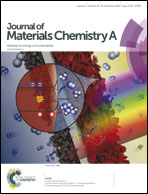First-principles and experimental studies of [ZrO(OH)]+ or ZrO(OH)2 for enhancing CO2 desorption kinetics – imperative for significant reduction of CO2 capture energy consumption†
Abstract
The most formidable challenge in each CO2 capture technology lies in its high energy consumption, which mainly results from slow CO2 desorption kinetics in every chemisorption-based CO2 capture process. This can be overcome by using catalysis. This research was designed to study the catalytic performance of [ZrO(OH)]+ resulting from the surface hydrolysis of ZrO2 on CO2 desorption with the decomposition of KHCO3 supported by ZrO2 and Al2O3 or KHCO3/ZrO2/Al2O3 by using experiments based on density functional theory (DFT) and thermogravimetric analysis (TGA). Computations show that H2O is substantially better than CO2 for adsorption on monoclinic ZrO2 (001) surface and intermediate [ZrO(OH)]+ and OH−, which results from the adsorption of H2O on the catalyst ZrO2 surface, and it can significantly accelerate the dissociation of HCO3−. This can reduce the energy required for CO2 capture. Furthermore, the catalysis function of [ZrO(OH)]+ predicted using computations was successfully confirmed with TGA and X-ray photoelectron spectroscopy (XPS) tests.
![Graphical abstract: First-principles and experimental studies of [ZrO(OH)]+ or ZrO(OH)2 for enhancing CO2 desorption kinetics – imperative for significant reduction of CO2 capture energy consumption](/en/Image/Get?imageInfo.ImageType=GA&imageInfo.ImageIdentifier.ManuscriptID=C8TA05894F&imageInfo.ImageIdentifier.Year=2018)


 Please wait while we load your content...
Please wait while we load your content...